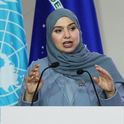One month after Cyclone Nargis, millions of Burmese remain with inadequate food, contaminated water and no proper shelter. At least 130,000 have died or gone missing, and the toll from epidemic disease in the coming months could be as high again.
We hear much about the administrative and logistical mire of Burma, of a government denying that disaster has struck and obstructing aid work. We hear about the confiscation of relief supplies. We hear less about the host of local Burmese organisations, often enjoying co-operation from local authorities and supported by a smaller number of international agencies, that are present on the sodden ground of southern Burma. There is an Asian response: experienced disaster teams from India and Thailand are arriving. Expatriate Burmese physicians are flocking home to help in a quiet relief effort. Senior monks have also joined the cause, gaining access to the hardest-hit regions, such as Bogale. Monastic, church and local volunteer networks are able to reach even remote villages inaccessible to international personnel. "Building trust with the military is essential," said a local doctor. "Without it, the politics take over."
Most emergency supplies can be procured locally, but relief teams lack funds to purchase fuel, rent vehicles and pay volunteers. Tragically, the first days of the disaster, when emergency logistics were most needed, passed without outside help. With a few days' warning and the aircraft and boats for an immediate response, many lives could have been saved. It's a rule of thumb in disaster response that the first assistance comes from the nearest source, and that it is small in scale but efficient. People struck by calamity are responders as well as victims. One of the big lessons from the response to the 2004 tsunami was that official aid efforts should support those local responses rather than—as too often happened—foreign experts arriving and deciding that they knew best.

The Burmese government's clear failures have led some to propose drastic measures. On 7th May, French foreign minister Bernard Kouchner invoked the "responsibility to protect" principle and suggested "a UN resolution which authorises the delivery [of aid] and imposes this on the Burmese government." He was threatening military intervention to provide relief. Meanwhile, British, French and American warships loaded with humanitarian supplies are closing in on the Burmese coast. Kouchner's proposal was not contradicted by David Miliband, who refused to rule out any options for assisting the Burmese.
Was Kouchner seriously proposing gunboat philanthropy? Geopolitically, even the strongest advocates of the responsibility to protect—such as its architect, former Australian foreign minister Gareth Evans—have disavowed military intervention in natural disasters such as Cyclone Nargis.
Did Kouchner believe that he would frighten the Burmese government into backing down? If so, his words had precisely the opposite effect. Fearing invasion, the Burmese government has mobilised its army, declared that all is well in the disaster-stricken area, and further restricted humanitarian access. Or was Kouchner playing the hero in a humanitarian theatre of his own imagination, using Burma as a stage to make humanitarian invasion thinkable? If so, his flight of imagination is costing lives today.
Burma's people need humanitarian action, not political posturing. Like the local relief teams we have to remain realistic but hopeful. Burma's generals will simply fight an international aid invasion. A glimmer of hope exists in Asian countries using diplomacy to gain access. While the political mire continues, we must trust the Burmese people to take the lead and support their efforts with money and expertise.
Donate to the Burmese relief effort athttp://betterburmesehealthcare.com/andwww.burmarelief.org










